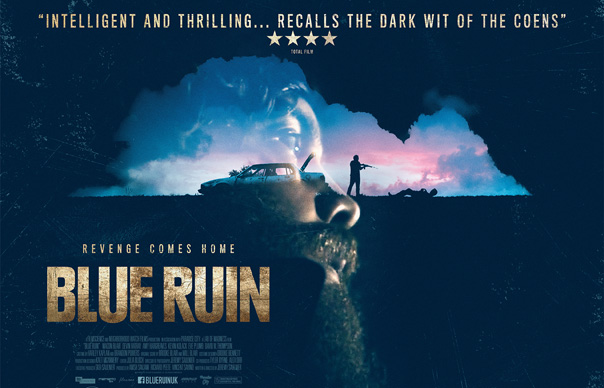There is something to be said for the shoe-string budget movie. Recent films like Locke (Tom Hardy having a meltdown while travelling in a car from Birmingham to London) proved to be a refreshing and inventive corrective to the seasonal trudge of blockbusters. Blue Ruin is a similarly impressive low-budget affair, showcasing two emergent talents: writer/director Jeremy Saulnier and lead actor Macon Blair. Saulnier's first film, 2007's Murder Party, was a slasher comedy about a group of art students in the New York hipster enclave of Williamsburg who plan to commit a murder as a piece of art to secure a grant. Although Murder Party was success on the festival circuit, Saulnier nevertheless ended up funding Blue Ruin himself, using his credit card and a Kickstarter campaign. It appears to have paid off: Blue Ruin is one of the best cult movies I've seen in a long while, a bracing example of ingenuity and economy. http://www.youtube.com/watch?v=W0XGOxFnm9A Saulnier's chief accomplice is Macon Blair, who also appeared in Murder Party. His Dwight is not the kind of man you would immediately have pegged as an avenging assassin. When we first meet him, he is living homeless, crashing in an elderly blue Pontiac on the Virginia coast - the Blue Ruin of the title. He has found himself reduced to these circumstances following the murder of his parents, and now drags his gaunt, haggard frame round the beach hunting for junk to sell on. Learning that the man who killed his parents, Wade Cleland, is being released from jail, Dwight cleans himself up and heads off for revenge, something he achieves remarkably quickly: what follows is the tense, darkly comic escalation of violence between Dwight and the rest of the Clelands. Saulnier makes good use of Blair’s hangdog looks – Dwight is an unusual anti-hero, stumbling as he clumsily executes his revenge strategy. Indeed, much of the strength of Blue Ruin is the way it upends expectations of what a revenge film should be. There are moments where the bloodlust is sated – a knife in the head in a toilet, a nasty incident with a crossbow bolt through the leg, some exploding heads – but Saulnier isn’t aiming for a superior kind of Rambo-style wish fulfilment. Saulnier makes moments of horror out of Dwight’s slip ups – where are his sister’s kids? When the violence comes, it is unexpected and gruesome, yes, but tinged with a sad inevitability. In fact, this is a quieter, darker film than you might expect. Convenient reference points would the Coens, in particular the mordant humour of Blood Simple; but also No Country For Old Men, another film about a protagonist who gets bad breaks and is in too far above his head for his own good. Follow me on Twitter @MichaelBonner.
There is something to be said for the shoe-string budget movie. Recent films like Locke (Tom Hardy having a meltdown while travelling in a car from Birmingham to London) proved to be a refreshing and inventive corrective to the seasonal trudge of blockbusters. Blue Ruin is a similarly impressive low-budget affair, showcasing two emergent talents: writer/director Jeremy Saulnier and lead actor Macon Blair.
Saulnier’s first film, 2007’s Murder Party, was a slasher comedy about a group of art students in the New York hipster enclave of Williamsburg who plan to commit a murder as a piece of art to secure a grant. Although Murder Party was success on the festival circuit, Saulnier nevertheless ended up funding Blue Ruin himself, using his credit card and a Kickstarter campaign. It appears to have paid off: Blue Ruin is one of the best cult movies I’ve seen in a long while, a bracing example of ingenuity and economy.
Saulnier’s chief accomplice is Macon Blair, who also appeared in Murder Party. His Dwight is not the kind of man you would immediately have pegged as an avenging assassin. When we first meet him, he is living homeless, crashing in an elderly blue Pontiac on the Virginia coast – the Blue Ruin of the title. He has found himself reduced to these circumstances following the murder of his parents, and now drags his gaunt, haggard frame round the beach hunting for junk to sell on. Learning that the man who killed his parents, Wade Cleland, is being released from jail, Dwight cleans himself up and heads off for revenge, something he achieves remarkably quickly: what follows is the tense, darkly comic escalation of violence between Dwight and the rest of the Clelands.
Saulnier makes good use of Blair’s hangdog looks – Dwight is an unusual anti-hero, stumbling as he clumsily executes his revenge strategy. Indeed, much of the strength of Blue Ruin is the way it upends expectations of what a revenge film should be. There are moments where the bloodlust is sated – a knife in the head in a toilet, a nasty incident with a crossbow bolt through the leg, some exploding heads – but Saulnier isn’t aiming for a superior kind of Rambo-style wish fulfilment. Saulnier makes moments of horror out of Dwight’s slip ups – where are his sister’s kids? When the violence comes, it is unexpected and gruesome, yes, but tinged with a sad inevitability. In fact, this is a quieter, darker film than you might expect. Convenient reference points would the Coens, in particular the mordant humour of Blood Simple; but also No Country For Old Men, another film about a protagonist who gets bad breaks and is in too far above his head for his own good.
Follow me on Twitter @MichaelBonner.



